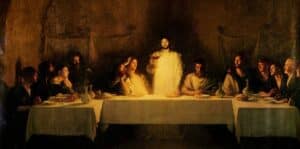“The Eucharist is the soul…of our life.”
Blessed James Alberione says, “The Eucharist is the soul that pervades all the hours, occupations, thoughts, relationships of our life. It is a vital current that influences everything, that communicates spirit even to the most common things. It forms a spirituality that we can live and communicate. It forms the spirit of prayer that, when it is cultivated, transforms every work into prayer.”
In other words, in the Eucharist we are invited to bring our whole experience to Jesus, to let him pervade every aspect of our life, to let him influence everything and give spirit even to the most mundane things. Jesus in the Eucharist gives life—Jesus in the Eucharist IS life.
What happens in the Eucharist is really a model for the spiritual life, and even more a model and criteria for vocational discernment.
We need to experience Jesus in the Eucharist; we need to experience and feel the needs of his people; and we need to experience ourselves at the service of these needs in order to make a good vocational discernment.
So what is really happening in the Eucharist? We can turn to the Gospels for this:

“Then Jesus took the bread, said the blessing, broke it, and gave it to them, saying, “This is my body, which will be given for you; do this in memory of me.” And likewise the cup after they had eaten, saying, “This cup is the new covenant in my blood, which will be shed for you. Do this in memory of me” (Lk 22:19-20).
If you notice, there are four verbs in this Gospel passage that tell us what is happening. When Jesus institutes the Eucharist, and every time the Eucharist is celebrated, Jesus does these four things: he takes, he blesses, he breaks, and he gives.
Jesus takes the bread.
When Jesus takes the bread and wine, he receives them into his hands. He looks at them, he touches them. He is aware of receiving them from his Father. In taking the bread and wine in this way, Jesus models for us an attitude of receptivity.
He says the blessing.
Jesus gives thanks for what he has received. He blesses and praises God his Father, and by doing so places himself in a stance of humility and of thanksgiving. To his attitude of receptivity, he adds an attitude of thanksgiving, of gratitude.
Jesus breaks the bread.
After taking the bread and wine, and giving thanks for them, Jesus breaks the bread in preparation for giving it to his disciples. He breaks it apart, tears it into fragments, makes it share-able. This speaks to the attitude of trust that Jesus has—trust that his Father will provide, trust that there will always be enough.
He gives it to his disciples, saying, “This is my body.”
The last thing that Jesus does is to give the bread and wine—now his body and blood—to his disciples. He gives himself to them, and he does it freely, without asking or seeking anything in return. He himself is pure gift to his disciples. He gives with an attitude of surrender.
Taking in receptivity, blessing in gratitude, breaking in trust, and giving in surrender.
This is the Eucharistic dynamic that Jesus offers to us in the Last Supper and every time the Mass is celebrated. It is the Eucharistic model that he gives us for living our spiritual lives, and in a special way for living vocational discernment. These same actions, these same attitudes are guide, model, and criteria for us.
Jesus takes, in receptivity.
As Jesus took the bread and wine, we are invited to “take” the circumstances and experiences of our life, the thoughts and feelings in our minds and hearts, and deeply receive and accept them. It can take a little bit of time to realize and familiarize ourselves with what our experiences have been, and to get to a place where we can bring them to Jesus, and see how tenderly he beholds them and us. But it is a cornerstone of discernment to come to know ourselves in the light of God’s love for us, and to accept ourselves in that same light.
Jesus blesses, in gratitude.
In the same way, we are invited to bless God for our experiences, for who we are and what we’ve lived, for the people and circumstances God has placed in our lives. It is true, some things are easier to bless God for than others! When it comes to things where it is easy to see the presence and action of God, we are simply called to welcome and live in the goodness of God present to us there. When it comes to the more difficult and painful moments of our life, we are still called to look deeply at these experiences and continually ask God, “Where were you then, and where are you now?” This act of looking places us in the stance of “the creature before her Creator” and helps us to move forward.
Jesus breaks, in trust.
Here we are invited to allow God to break us open, to let him break open our experiences, our thoughts, our feelings, our images of ourselves, of others, and of God. We are invited to be broken open by our desire for God—broken open so that God can love us and can love through us. This doesn’t come naturally to us! We would rather be put together, know what’s going on, be in control of our own life. But when do allow ourselves to be broken, we have this marvelous experience of trust and of love—often a deeper love than we have known before, because we are being loved precisely in the places where we thought we couldn’t be.
Jesus gives, in surrender.
Like Jesus, who gave himself totally and freely to his disciples, we are called to give of ourselves totally and freely. Vocation, ultimately, is how God is asking us to make a gift of ourselves to him in the world. Jesus in the Eucharist teaches us how to surrender ourselves so that we can give ourselves. Each of us is a precious gift to the world, and God wants to make of us a continuous and ever-more precious gift to the world. In the Eucharist, Jesus teaches us how.
Blessed James Alberione encouraged the Daughters of St. Paul and the Pauline Family to “live a Eucharistic day.” By this he meant to live a day directed toward the Eucharist, and flowing from the Eucharist. Living in this Eucharistic dynamic of taking, blessing, breaking, and giving is another way to live a Eucharistic day, to live our life and our vocational discernment totally centered on Jesus in the Eucharist.
“We must place the Eucharist at the core of our life,” Blessed Alberione said. Jesus, may we place you in the Eucharist at the core of our life and at the core of our discernment. Amen.
Reflection Questions:
How do you think of the Eucharist? How do you refer to the Eucharist? Do these ways of thinking help you to remember and embody that the Eucharist is the SOUL of your life?
What experiences is Jesus inviting you to take up, to bless God for, and to be broken open?
How are you already giving of yourself? How is God stretching your heart and inviting you to give of yourself in new and different ways?

